You have dreamed about this—this world which is different from ours and actually worldbuilding for fantasy in general.
It’s interesting, it’s riveting…
Now you want to share this world that has been created in your head with the world.
It’s not easy to write and writing a book which is completely or mostly imaginary is even harder. How do you even start?


Book Outline Generator
Choose your Fiction or Nonfiction book type below to get your free chapter by chapter outline!
Book Outline Generator
Enter your details below and get your pre-formatted outline in your inbox and start writing today!
CONGRATULATIONS
Thanks for submitting! Check your email for your book outline template.
In the meantime, check out our Book Outline Challenge.
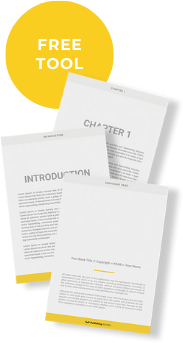
Maybe you have your world figured out but don’t know anything about your characters, about the plot, the conflict, the resolution, nothing. You just have the magic and fantastical element figured out but don’t know how to convert that into a story idea you’re proud of.
Well that’s the fun in being a writer. Now let’s sit down and figure this out!
Here are our tips for fantasy world building:
- Understand what makes a book fantasy
- Get started on your fantasy book
- Worldbuilding a fictional world
- Time in world building
- Worldbuilding location
- Worldbuilding laws and governments
- People in world building
- Worldbuilding history
- How to build a society
- Worldbuilding religion
- Magic systems
- Creating an economy
- Worldbuilding daily life
What is a fantasy novel?
While many book genres exist, nothing sweeps you off of your feet (or your bed, if you read before turning in for the night), than a well thought out, captivating, and magical fantasy book.
The only thing absorbing you in other fiction books that take place in our reality is the plot and main characters. But in fantasy, you get the IMAX experience – characters, plots, and a gripping fantastical world.
Who doesn’t want to escape and read about wizards and warlocks, vampires and werewolves, hobbits and fairies, ghosts and zombies, witches and aliens, magical creatures and monsters, and of course, superheroes and villains?
Fantasy novels immerse the readers into that curated world and take them along the journey.
Like almost every book-reader in the world, a series which I grew up with is Harry Potter. Of course Harry, Ron, Hermione, and all the other characters are incredibly well-written that have you coming back for more, but one of the things that have to this date gripped audiences is the world of Witchcraft and Wizardry – Hogwarts, Ministry of Magic, how wizards operate on a day-to-day basis, Quidditch, and much more.
I mean, to this day you have Harry Potter fans visiting King’s Cross station to see platform 9 ¾.
That’s the power of good world-building. Years after your book has published, you still have your audience feeling home-sick for that world.
How Do I Get Started on My Fantasy Novel?
You have an active imagination, you have an idea of your fantasy world, and now it’s finally time for you to start writing your book.
After some time procrastinating on Instagram, you finally sit down to write but aren’t sure how to start explaining your fantasy world. Or you suddenly realized a loophole or fault in that world.
Don’t worry. Creating a fantasy world which is believable and loved by your readers is possible! If you’re also coming short on ideas, try searching through these writing prompts.
Before you start your story, getting a cup of coffee, and getting your laptop out to start writing, you need to do one important step: Plan and draw it all out in a comprehensive outline!
Before doing anything else, it is important for you to sit down and plan your world. Do your book research.
Why do you think a lot of fantasy books have a map and/or symbols drawn on the front of the book? It’s not just for the author’s own organization; it also gives the readers an understanding of the physicality of the world.
If any point in the story, a reader is lost in the imagery and needs clarification, they can just turn back to the map and clear their doubts.
Step 1 for Starting to World Building Fantasy:
Start by drawing your landscape, your characters (especially if they’re not human-like), any symbols, weapons, buildings, and other imagery.
Focus and write out the world’s culture, people, history, weather, food, traditions, societal norms, religion, and other elements you learn about in this post.
Step 2 for Starting to World Building Fantasy:
The devil is in the details. Sit down and dash it all down along with a ton of scribbling, erasing, and cutting. If you don’t you will leave those dreaded plot holes.
If things don’t perfectly connect and instead tend to contradict each other, your reader will get lost and might feel frustrated.
Your base needs to be strong and this is the perfect time for you to strengthen that base so that the rest of your book flows much easily. It’s like math; if you never understood the bases, you’ll always struggle. Don’t worry—writing is not as difficult as math, it doesn’t make you cry tears (for the most part).
Step 3 for Starting to World Building Fantasy:
Accept the truth.
The hard truth is this: it’s harder to write fantasy than it is to write any other genre or non-fiction.
If my story was set on Earth and involved just humans in our timeline, I don’t need to guess anything. If my characters are set in Toronto, Canada in 2019, I know for a fact that it is spring in Toronto, Justin Trudeau is Prime Minister of Canada, and poutine is sold there. My whole book is set in a real world, where everything is already set. All I need to do here is do some research on Canada and write my book.
But if I’m writing a fantasy book, I have to figure out that world all by myself. Sure it’s time-consuming and challenging but how fun is fantasy to read and write?
You and your reader will get to get lost in your world.
As said by George R. R. Martin, the author of one of the most famous series in the world,Game of Thrones:
“We read fantasy to find the colors again, I think. To taste strong spices and hear the songs the sirens sang. There is something old and true in fantasy that speaks to something deep within us, to the child who dreamt that one day he would hunt the forests of the night, and feast beneath the hollow hills, and find a love to last forever somewhere south of Oz and north of Shangri-La. They can keep their heaven. When I die, I’d sooner go to middle Earth.”
And honestly, yes! Bring on all the mysteries, magic, and alternate realities.
How do you world build a fictional world?
In order for your reader to not get lost and connect with your world, it is important for you to describe it perfectly.
This doesn’t mean that you have to list absolutely anything and everything, but you should at least have your readers understand the basic structures and elements of your world.
Your description of the world has to be as cohesive as possible or else your story would come across as choppy and fragmented, making the reader feel frustrated soon enough.
One of the best tips for this is to use the old rule of “show, don’t tell” when writing.
All of this information you build has to come across to the reader, but you can’t just tell them everything in an info-dump.
What you want to do is leak the information about your world into the narrative with as much showing as possible. Paint the picture with your world through scenes and setting so your readers interpret it themselves.


Book Outline Generator
Choose your Fiction or Nonfiction book type below to get your free chapter by chapter outline!
Book Outline Generator
Enter your details below and get your pre-formatted outline in your inbox and start writing today!
CONGRATULATIONS
Thanks for submitting! Check your email for your book outline template.
In the meantime, check out our Book Outline Challenge.

Fantasy World Building: The Essentials You Must Cover
The 10 elements of world-building that you should ponder over and plan so that your audience falls in love with your fantasy novel are:
#1 – Time in Worldbuilding
Is your novel based in our time? Is it based during World War 1, the Ottoman Empire, when Prussia existed?
Or is it in the future: 2080, the end of the world, or post-apocalyptic?
Or better yet: is it based on another planet or a whole other magical world where our definition of time is irrelevant?
Like The Good Place, does a part of your world follow a weird and different time like Jeremy Bearimy?
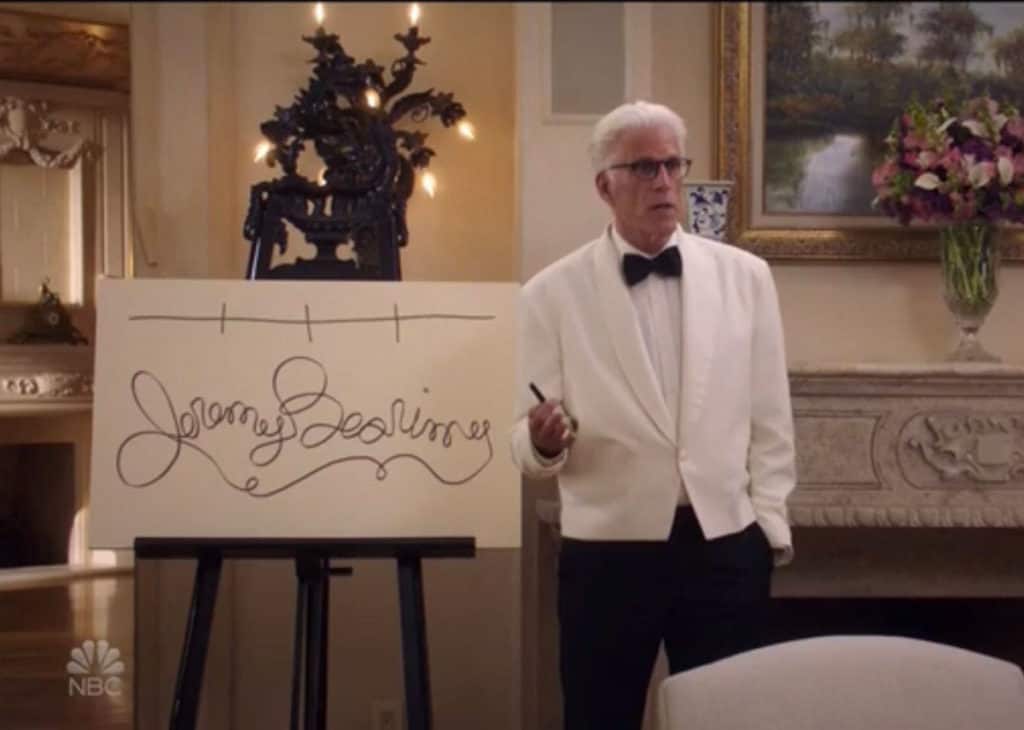
Once you’ve established your timeframe, it is easier to then think about the specifics of the world. If it’s during WW1, then you can’t have cell phones, if it’s in 2080 maybe instead of cars there are flying drones.
Or in your world, no elements of our society exist. Aladdin is its own magical realm where the mode of transportation is horses, carriages, or a magic carpet.
The possibilities are endless.
#2 – Location
Location, along with time, plays a key role in your world building. If your characters are in Paris in 1945, they are fighting in WW2 but if they are in India, they are fighting for their independence from Britain along with Gandhi.
If your world is completely imaginary, it then helps answer whether your world has continents, countries, and cities?
Does it have buildings like ours or some high-tech ones that keep floating in air?
Your location then also helps figure out other important elements of your world such as the culture, people, and political systems, which we’ll get to below.
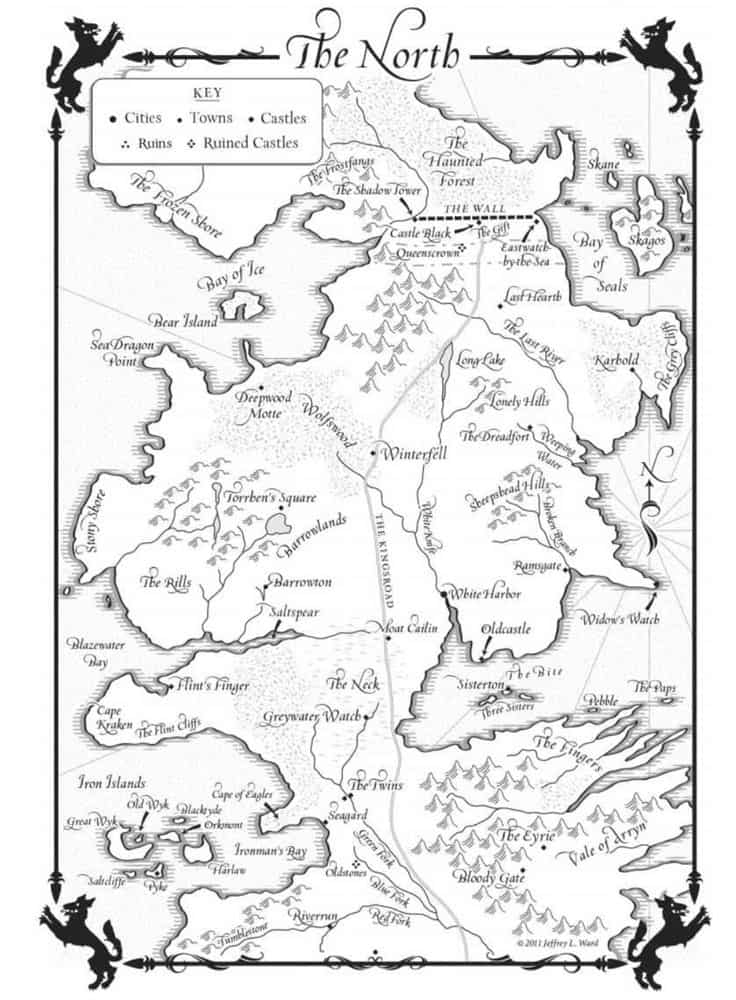
#3 – Laws & Government
Just like our world, this fantasy world of yours will also have the basic fundamentals and structures that make a functioning society.
Of course, instead of having a male or female President, your world’s political system might have an eight-feet tarantula who is the one True Ruler.
Here are some fantasy worldbuilding questions for laws and government:
- Who or what are the ruling class and what method of governance do they use?
- If magic exists in your reality, what are the rules and regulations surrounding it?
- If someone breaks a rule, do they go to prison, are punished, or exiled?
- Who enforces the laws in general?
- Is there some sort of organization to laws and the justice system?
Maybe whoever kills the Ruler becomes the new Ruler, or according to a prophecy, the true Ruler is the one person who is born on the 4th new moon of the year at exactly 1:02 a.m.
Thinking about these different elements is a great way to tie in your own morals and values, along with your story’s themes, in a cohesive manner.
#4 – Worldbuilding People in Fantasy
There’s a ton to consider when you’re world building for fantasy people.
Here are some question to ask when doing this:
- Is your protagonist a human like you and me or a half alien from an imaginary world, one-third wizard, and the rest a bird?
- Are all the people exactly the same or characterized based on their gender, race, age, number of feet, what animal head they have?
- Maybe the ruling class can only be birds but the local population is a mixture of birds and raccoons?
- What language do the people speak? Of course your book would be written in English or any other language, but there might be a language that your characters use?
This could be a cool and fun way for you to include a sentence or two in a made-up language (of course, include a translation for it to not confuse your readers). This will also make it easier for you to write dialoguebetween the characters.
You may also consider if the people live in our world but live in the shadows and are invisible?
Cassandra Clare’s Mortal Instruments series features us humans, vampires, werewolves, faeries, angels, demons, warlocks, and an imaginary race of humans that are a mix of humans and angels known as ‘shadowhunters’.
They are invisible and everything they use—weapons, appearances, and buildings—are invisible or enchanted in some way.
Species is one of the most important part of your world. In your head, you should have an absolute clear and detailed image of how all the people look like.
#5 – World History
History is what defines and shapes our present. Every world has its history which makes it—its culture, people, government, traditions, etc.
Historical events will also pose as a point of friction and plot point for you world.
Do the vampires in your world hate the witches because centuries ago a group of witches massacred vampires? Is 2230 Earth a dystopian society cause of a zombie apocalypse breaking out in 2095 due to climate change?
Without a strong historical base and understanding, it would be very difficult to understand the situations and choices that your current characters and their surroundings are taking.
History explains the why of the way current society functions.
#6 – Society in Fantasy Novels
All of the characters combined along with their social identifiers, history, and relationship to each other creates a society.
Answer some of these world building questions for forming your society:
- In your world, what is the basis of your society?
- Does a class system exist with poor and rich people?
- What’s the family structure like?
- Are relationships monogamous or polyamorous?
- Are same-sex relationships accepted or frowned upon?
- How do gender roles operate?
Usually our real life societal elements of sexism, racism, classism and others are adopted and reflected in other ways in a fantasy novel. In Harry Potter, racism is reflected in the way Purebloods hate Mudbloods and Muggles.
Find your unique take on societal issues and reveal it in an interesting way.
And remember: you do NOT need to follow our societal structures. You can say “to hell!” with any sexism/racism if you want. There are many other conflicts your story can have without maintaining our own toxic shortcomings as a society.
#7 – Religion in Fantasy
Religion may or may not play an integral role in your world. However, as an important part of society, it will affect your characters and the general values and traditions of the society.
What do they believe in? What are their values?
You can create a religion which worships God(s) or Deity(ies), a cult-like religion which calls for human sacrifices, or create a world in which religion is banned.
Mythologies are ancient stories that characters grow up listening. They are believed to be false or very dramatized religious events, however, to understand a society’s functionality and history, they are important to know. What’s the famous legend or folklore of your world?
Create a backstory for this religion as well. In fact, treat religion as a type of character archetype and fully flesh it out with details, rituals, and more.
#8 – Worldbuliding Magic in Fantasy
In fantasy novels, magic usually plays a huge role. Magic is what defines the fantasy genre.
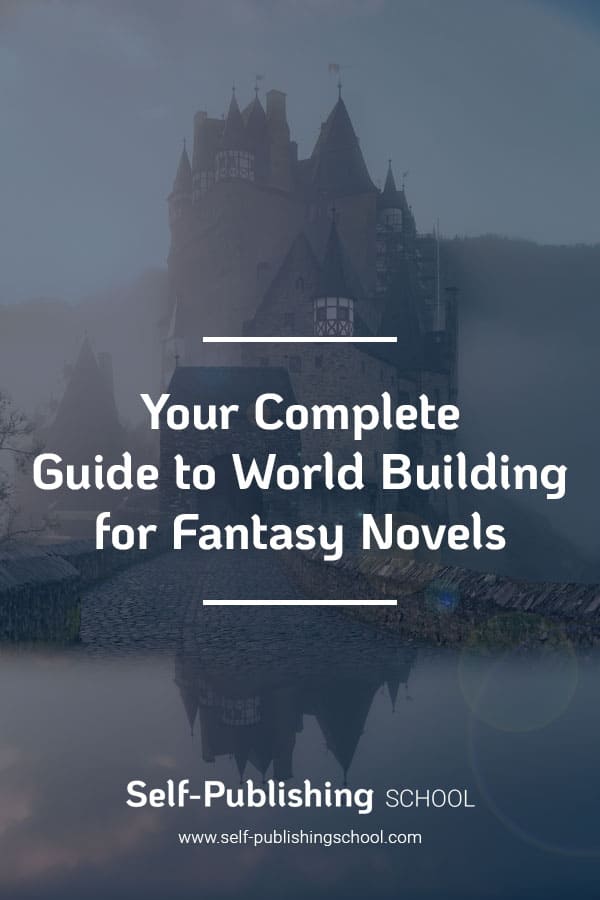
If there is no magic, it’s not fantasy.
To truly make your world a gripping one, carefully creating the magical aspect of it is important and also a lot of fun!
Ask these questions when world building a magic system:
- What type of magic exists?
- Do only wizards and witches have magic or some other creatures possess it too?
- Or is it magic accidentally born out of a science experiment gone wrong?
Even Spider-man’s powers could also be considered magic as he got them after being bitten!
Or is magic banned in your society with only a few in the ruling class being able to employ it?
This also brings into the question the other important aspects of magic that you need to consider: the rules and regulations surrounding magic.
Can anyone of any age utilize it or just a few? Is magic taught and tested or does it just come naturally?
Magic is the essence and heart of fantasy. Make sure you do it right.
#9 – Economy in Fantasy Novels
Not only does economy include the existence of classes or social strata, it also includes the kinds of professions that exist in your world. Are doctors as well-respected and highly-paid as they are in our world or are they considered useless as magic is the sole healer?
What currency does your world have? Does it have banks or other financial institutions or do people just keep all their money with them?
Does currency even exist or is a barter system in place?
Make sure to have a firm understanding of how your characters acquire goods and services in your novel. This bit will help in worldbuilding other elements as well.
#10 – Daily Life in Fantasy
Finally once you’ve figured all the above elements of your world, this should come naturally.
What does a normal day look like in your world?
Just think about your own daily routine. Most people have the same ones – wake up in the morning, eat breakfast, go to work or school/university, eat lunch, come back home and maybe go to the gym, cook some dinner and watch t.v. before you finally go to bed.
Of course endless other little things might be included in it, like if you stopped for groceries, walked your dog, went to the doctors’ etc., but the basis is pretty common for everyone.
Jenna Moreci, author of The Savior’s Champion, does a really great job of showing us the day-to-day for her main character, Tobias, as seen in the example below.
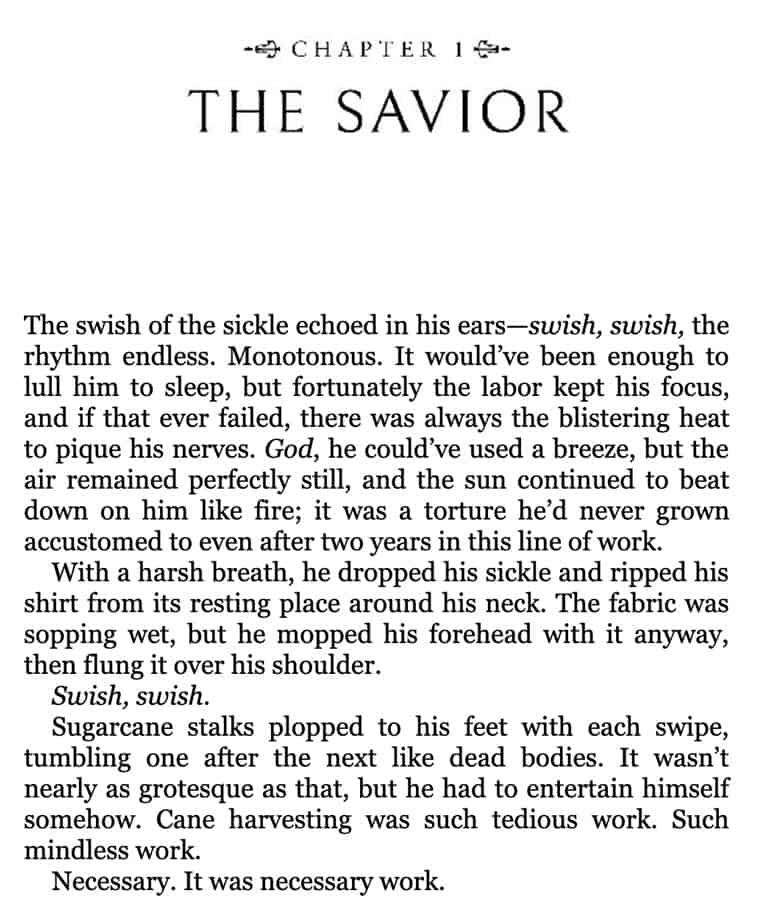
Here, we can see what Tobias’s everyday life looks like, and if you’ve read the book blurb and know what this book is about (hint: a tournament to the death), you can see just how much those two things create an intriguing contrast.
Fantasy World Building Final Tips…
Now that you know the time period, location, people’s characteristics, type of society, laws and government, existence of magic, religion, and economic system, you can easily figure out what your character’s day to day life is like.
Of course, to advance your plot and keep your readers interested, your characters would probably be on some crazy adventure doing extraordinary things, and not just following their normal routine.
However, other characters would be and it is important to show what the rest of the world is doing while these few people are on their journey.
By strengthening these 10 elements of your world, not only will your world be interesting to read, it will also help you organize yourself while writing. If you need a template to have this all figured and written down, you can try this BookMap.
And now finally, once all these details are out of the way and you have a clear understanding of your world, there’s only two things left to do: love your book and write it!
Building a world can be a lot of fun but it is also a very tedious and laborious process. Create a world that you love! If you aren’t excited imagining, writing, and reading your fantastical world, your readers won’t either.
As Stephen King mentions:
“When you write a story, you’re telling yourself the story. When you rewrite, your main job is taking out all the things that are not the story. Your stuff starts out being just for you, but then it goes out.”
Find everything that makes this world of yours special. And don’t worry about creating the next fantasy hit, this one’s all you.


Book Outline Generator
Choose your Fiction or Nonfiction book type below to get your free chapter by chapter outline!
Book Outline Generator
Enter your details below and get your pre-formatted outline in your inbox and start writing today!
CONGRATULATIONS
Thanks for submitting! Check your email for your book outline template.
In the meantime, check out our Book Outline Challenge.
